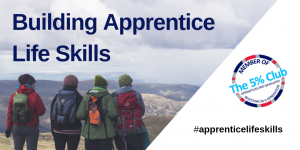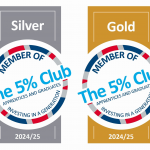Employers from a range of sectors share some of their top tips for building life skills amongst apprentices and young employees. Business members of The 5% Club and their apprentices shared their experiences at a The 5% Club event on Developing Apprentices beyond their Apprenticeship today in Sheffield.

Resilience, teamwork and self-awareness are all great skills for young employees to learn to thrive in the workplace. However, they can also help them in their personal lives – in relating to family and friends, pursuing their own interests and achieving their personal goals.
Business members of The 5% Club, who all aspire to create ‘earn and learn’ positions for five percent of their workforces, say that building life skills in apprentices can lead to great performance at work and happier, more productive employees.
Here, they share their top tips for developing life skills and resilience in apprentices, beyond their apprenticeship training, through opportunities within the workplace and beyond.
1. Reverse mentoring more senior employees
‘Reverse mentoring’ entails switching up a traditional mentoring approach by younger employees supporting more experienced employees with developing skills like using technology or communicating with younger generations. Reverse mentoring schemes benefit both the mentor and mentee, creating connections across generational divides and empowering our younger generations to develop others.
Defence company QinetiQ is trialing a new reverse mentoring programme for its employees. Ross Chell, an apprentice project manager, from Narberth in West Wales, has been mentoring Wayne Grant, who is the Head of Aerospace Engineering, as part of the reverse mentoring scheme. He now manages projects in the Advanced Services and Products team at the Farnborough technology facility in Hampshire.
Ross Chell says: “Reverse mentoring is brilliant as it helps both the mentee and the mentor equally. Through reverse mentoring, my time-keeping skills have improved dramatically and I am helping my mentee to develop his communication skills with his younger audiences. One way is by introducing a WhatsApp group for Wayne, as the Head of Aerospace, and all of the apprentices and graduates in his discipline. This gives them a direct link to Wayne and allows them to have important conversations almost instantly, rather than Wayne having trail through his emails to respond.”
Caroline Huffam, the Lead for Coaching, Mentoring & Leadership Development at QinetiQ, says: “Whilst we are currently running a pilot programme and most of our leaders have only had two sessions with their mentors, the feedback I have received so far is extremely positive and we have a number of leaders waiting to get involved.”
2. Taking part in team challenges
Physical challenges such as Outward Bound, Duke of Edinburgh’s Award and the Brathay Challenge can help to build confidence, teamwork and leadership in apprentices very quickly.
Suela Murati has been an apprentice at pharmaceutical company GSK for less than a year. She completed an Outward Bound course in April 2019, where she worked with 80 other GSK apprentices to develop skills such as teamwork and communication whilst participating in activities like abseiling and ghyll scrambling.
Steve Stewart, GSK Global Apprentice Lead, says “Suela has progressed fantastically since she did the course. She is organising a large event for more than 2000 employees this year – a job Suela says she could never have done before she did Outward Bound.”
John McCarthy of The Outward Bound Trust says:
“We act as an accelerant to grow apprentices’ and graduates’ awareness of the impact of their behaviour on others, whether that’s clients, colleagues, family or friends. Our programmes are physically and mentally challenging and are a catalyst to increased self-awareness.
“At Outward Bound, early careers talent are empowered to take ownership of their own careers and understand the need to develop their personal brand – and good employers know that these skills are great for business as well as being good for their talent.”
3. Time off for military or police service or volunteering
Encouraging apprentices to volunteer for service in their community can complement the skills they acquire from their apprenticeship training. Many members of The 5% Club, such as Balfour Beatty and Serco, have also signed up to the Armed Forces Covenant. They are forces friendly employers and encourage staff to become reservists, support staff with family members in the military, and employ ex serving personnel.
Allowing apprentices time away from the workplace for duties in military, police or community groups often engenders strong teamwork and leadership skills and satisfies their wider desires for camaraderie and to give something back.
Lt Col Ingrid Hall OBE, who leads the apprenticeship programme for the Armed Forces said:
“The Ministry of Defence is co-hosting this event with The 5% Club because the Armed Forces place great importance on building life skills in our serving personnel and civil servants. The Armed Forces has one of the largest nationally recognised apprenticeship programmes in the UK with around 20,000 personnel enrolled on it at any one time.
Defence needs a skilled, sustainable, capable workforce trained and equipped to protect the nation’s interests; the MoD apprenticeship programme is intrinsic to achieving this aim. The skills and qualifications gained by military personnel throughout their careers, including apprenticeships, make them highly employable beyond their military Service.”
4. One-to-one coaching
Coaching provides people with one-to-one support from a coach who is independent to an individual’s management chain and team. Coaching provides apprentices with an opportunity to explore how to handle their new responsibilities and can also help them to learn important life skills.
Coaching can help newer employees deal with balancing the demands of life, work and study and with working effectively with other people. Having someone to turn to outside of the chain of command, means coaches often help apprentices to identify how to have their voice heard with senior people. Coaching can also help them to feel confident when dealing with their tutors, parents and peers.
QinetiQ also runs a coaching programme which is available to all its apprentices. Caroline Huffam of QinetiQ says: “Coaching enables our people, no matter what point they are in their career, to reach their full potential by knocking down barriers and finding their own ways forward.”
QinetiQ apprentice Ross Chell, says: “I signed up for coaching through QinetiQ in order to develop my focusing skills. After just a couple of months with my coach Jane, who is the Group Lead for Business Admin, I have already noticed a significant improvement in my focusing abilities. I used to find that I would end up doing around three jobs at once, simply because another job seemed more interesting at the time. But now I can commit myself to completing a task more intently before moving onto the next.”
5. Looking after personal wellbeing
When thinking about how to develop their career and perform at the highest level, the number one priority for apprentices should be to look after themselves and their own wellbeing.
Mike Thompson of Sustain HR says: “The most important thing for apprentices is to make sure they take time to look after their own mental and physical well-being, so that they are well prepared for the ups and downs of work life. They will need to be able to deal with stress and develop tools to help build resilience.
“This could be as simple as exercising regularly, practising simple mindfulness techniques, taking time to ensure they eat and sleep well and having a support network who they can talk to when they face challenges.”




